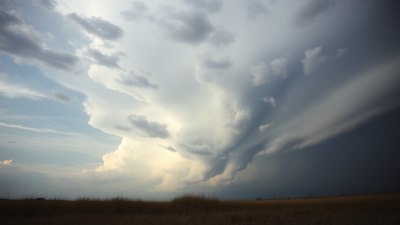What Would Happen If We Could Actually Control the Weather for a Day
Explore the consequences and possibilities of controlling the weather for a day.

This image was created with the assistance of DALL·E
The concept of weather control has long been a topic of fascination in science fiction and climate studies. Imagine a world where humanity could dictate the weather for an entire day. Such a power would undoubtedly have profound implications for various aspects of life on Earth.
Understanding Weather Control
Weather control refers to the theoretical ability to manipulate the atmospheric conditions to suit human needs. Techniques like cloud seeding have already been explored, aimed at inducing rain in arid regions. However, full control over weather patterns is still beyond our reach, largely because of the complexities of climate systems.
The Science of Weather Manipulation
To comprehend the potential of weather control, one must first understand the science behind weather patterns. The atmosphere is a dynamic system influenced by numerous factors, including temperature, humidity, wind speed, and air pressure. These variables create a web of interactions that are challenging to predict and manipulate.
Immediate Benefits
Imagine being able to summon sunshine during a rainy day for an outdoor wedding or create a cooling breeze during a summer heatwave. The immediate benefits of controlling the weather for a day could enhance human events, agriculture, and even disaster preparedness. For instance, farmers could optimize crop yields by ensuring the right amount of rainfall and avoiding droughts. Likewise, outdoor events would significantly improve their success rates with predictable weather.
Economic Impact
The economic ramifications of weather control could be staggering. Industries such as agriculture, tourism, and outdoor recreation would see significant boosts. Farmers could maximize production efficiency, while tourism sectors could attract more visitors by guaranteeing favorable weather conditions. An escape from unexpected weather disruptions would likely lead to increased profits across various domains.
Environmental Considerations
While controlling weather might offer immediate benefits, it could also have detrimental effects on the environment. Manipulating weather can lead to unintended consequences, such as altering local ecosystems. Animals and plants are adapted to specific weather patterns, and significant changes could disrupt food webs and ecological balances.
Ethical Dilemmas
The very concept of controlling the weather raises numerous ethical questions. Who decides when and how to manipulate weather conditions? An inequitable access to weather control could exacerbate existing social inequalities. Wealthy nations may prioritize favorable weather for their recreational needs, neglecting less fortunate regions suffering from droughts or floods.
Global Ramifications
Weather does not respect geopolitical borders. A country controlling its weather could unintentionally affect neighboring areas. For example, increasing rain in one country may divert weather patterns that lead to drought in another. Such actions could spur geopolitical tensions and conflict over resource allocation and environmental management.
Cultural and Psychological Effects
Weather plays a significant role in shaping culture and psychology. Many cultures have deep-rooted connections to their local climate, influencing traditions, rituals, and even attitudes. If people could manipulate the weather, it could alter these cultural narratives, leading to a disconnection from nature.
Disaster Preparation
Weather control could revolutionize disaster preparedness. For instance, if a dangerous storm were predicted, authorities could neutralize its intensity or redirect its path. This would not only save lives but also minimize economic loss from destructive weather events such as hurricanes or tornadoes.
Potential for Abuse
On the flip side, the power to control weather brings the risk of severe abuse. If governments or corporations could alter weather for financial gain or political power, the consequences could be catastrophic. Imagine a situation where a powerful entity creates artificial droughts in regions to pressure governments or manipulate food supplies.
Effects on Health
The weather affects our health directly and indirectly. Controlling weather could lead to cities experiencing optimal air qualities and comfortable temperatures, reducing the instances of heat-related illnesses. Conversely, there could be unforeseen consequences, such as increased pollen levels if precipitation is overly manipulated, leading to heightened allergies and respiratory issues.
Long-Term Consequences
What would happen if the ability to control the weather were to persist over the long term? While short-term benefits might seem appealing, the long-term consequences could include significant disruptions to the natural progression of seasons and climate. If not managed properly, this constant alteration of weather patterns could lead to drastic shifts in climate, ultimately endangering biodiversity and ecological health.
Technological and Infrastructure Development
The quest for weather control would undoubtedly spur advancements in technology. Innovations in meteorology, renewable energy, and environmental science could emerge, geared towards understanding and managing climate systems better. Furthermore, infrastructure would evolve to support such technologies, influencing city planning and environmental policies.
The Role of Technology and Innovation
Advancements in technology could facilitate the exploration of weather control. Innovations in artificial intelligence, data analysis, and environmental sciences would be crucial in understanding weather systems better and implementing control measures effectively.
Lessons from Nature
Nature operates within its set of rules and rhythms. While humanity might gain the ability to control the weather for a day, it is important to remember that nature has a remarkable way of maintaining balance. Interfering too much could lead to unintended consequences that would be challenging to reverse.
The Future of Weather Control
As technology advances, the dream of weather manipulation might eventually become a tangible reality. Continuous discussions about its implications will be critical. Collaboration among governments, scientists, and communities would be essential to establish ethical frameworks and regulations, ensuring that such power does not become a tool for exploitation.
Conclusion
The thought of controlling the weather for a day is a double-edged sword, bringing forth both incredible possibilities and significant challenges. While enjoying the immediate benefits, humanity must consider the long-term ecological, social, and ethical implications of such power. Ultimately, our relationship with nature must guide our decisions, ensuring that our attempts to control weather promote sustainability rather than exploitation.











